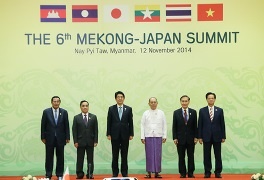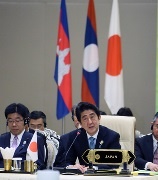Asia
The Sixth Mekong-Japan Summit Meeting
 (Photo: Cabinet Public Relations Office)
(Photo: Cabinet Public Relations Office)
 (Photo: Cabinet Public Relations Office)
(Photo: Cabinet Public Relations Office)
On November 12, commencing at 7:45 p.m. (local time) for approximately 30 minutes, the Sixth Mekong-Japan Summit Meeting (hereafter referred to as "the Mekong-Japan Summit") was held in Nay Pyi Taw, Republic of the Union of Myanmar. Mr. Shinzo Abe, Prime Minister of Japan co-chaired the Summit with H.E.Mr. U Thein Sein, President of the Republic of the Union of Myanmar. The outline of the meeting is as follows. (The Summit was also attended by Prime Minister Samdech Akka Moha Sena Padei Hun Sen, the Kingdom of Cambodia (H.E. Mr. Hor Namhong, Deputy Prime Minister and Minister of Foreign Affairs and International Cooperation attended the Summit as Prime Minister Hun Sen's representative from midway), H.E. Mr. Thongsing Thammavong, Prime Minister of the Lao People's Democratic Republic, H.E. Mr. Prayuth Chan-o-cha, Prime Minister of the Kingdom of Thailand, and H.E. Mr. Nguyen Tan Dung, Prime Minister of the Socialist Republic of Viet Nam). The result of the Summit was released as a joint statement.
- Joint Statement(PDF)
 (65KB)
(65KB)
- At the beginning, President Thein Sein expressed gratitude for the support and cooperation Japan has extended to the Mekong region thus far. In response, Prime Minister Abe stated that under "diplomacy that takes a panoramic perspective of the world map," active high-level mutual visits are continuing this year and the Mekong-Japan relationship is steadily deepening. Prime Minister Abe said he would like to reconfirm the direction of the Mekong-Japan cooperation towards the building of the ASEAN Community and the last year of the "Tokyo Strategy 2012" in 2015.
- Regarding the development and the future direction of the Mekong-Japan cooperation, Prime Minister Abe explained that Japan is working diligently on the three pillars of the Mekong-Japan cooperation, which are "Enhancing Mekong Connectivity," "Developing Together," and "Ensuring Human Security and Environmental Sustainability," and of the 600 billion yen of support pledged in the "Tokyo Strategy 2012," more than 500 billion yen is already being steadily implemented. In addition, Prime Minister Abe said:
- (1) Where "Enhancing Mekong Connectivity" is concerned, in order to respond appropriately to the massive infrastructure demand in the Mekong region, Japan is proactively promoting packaged infrastructure exports as well as steadily developing the Southern Economic Corridor (SEC) and East-West Economic Corridor (EWEC). Prime Minister Abe explained that quality infrastructure is Japan's strong point.
- (2) With regard to "Developing Together," Prime Minister Abe stated that, in order to pursue win-win economic development with the Mekong region countries under "Abenomics", Japan will work diligently on the new drafting of the "Mekong Industrial Development Vision," as well as deepening the public-private dialogue and cooperation, improving the investment environment and strengthening people-to-people exchanges including tourism.
- (3) Commenting on "Ensuring Human Security and Environmental Sustainability," Prime Minister Abe stated that Japan will continue to contribute to water resources management in the Mekong region via the contribution of approximately 500 million yen to the Mekong River Commission and the dispatch of Japanese expert, and explained that Japan and Thailand will co-host the 3rd Green Mekong Forum in Bangkok in December this year.
- (4) Furthermore, Prime Minister Abe stated that coordinating with other countries and international organizations is also important for further developing the Mekong region, and in particular, he will work to strengthen cooperation with the United States in the fields of the environment and supporting women entrepreneurs, and strengthen cooperation with the OECD in improving the investment environment via the OECD South East Asia Regional Programme, and supporting small- and medium-sized enterprises.
- The remarks made by the leaders of the Mekong region countries in response to this are outlined as follows:
- (1) The Mekong-Japan cooperation based on the three pillars of the "Tokyo Strategy 2012" is essential to the prosperity and development of the Mekong region, and the leaders appreciate the remarkable progress in that. They are grateful for Japan's long time contribution to the Mekong region, and requested Japan's continuous support.
- (2) In particular, the leaders of the Mekong region countries highly appreciated that, Japan is playing a constructive role by utilizing the expertise and experience of both the public and private sectors, in fields such as infrastructure development, including support for economic corridors, the Dawei Special Economic Zone Project, disaster reduction and water resources management. In connection with this, they welcomed the Green Mekong Forum co-hosted by Japan and Thailand in December this year and the Third World Conference on Disaster Risk Reduction to be held in Japan in March next year.
- (3) The leaders stated that they would like to continue to hold discussions between Japan and Mekong countries on the direction of the Mekong-Japan cooperation beyond 2015, in the lead up to the next Mekong-Japan Summit.
- Lastly, Prime Minister Abe reiterated that under the "Proactive Contribution to Peace" policy, Japan is determined to continue her contribution to peace and stability of the region in partnership with the Mekong region countries, and the leaders affirmed that the Seventh Mekong-Japan Summit will be held in Japan in July 2015.

